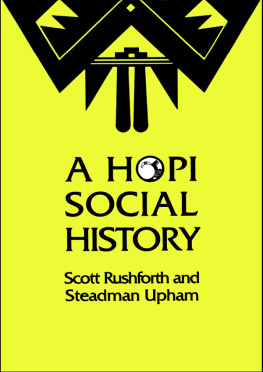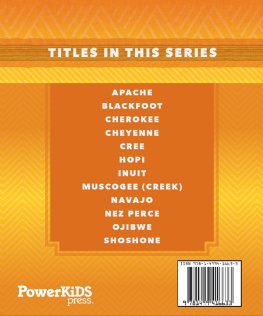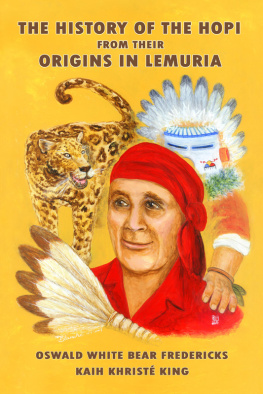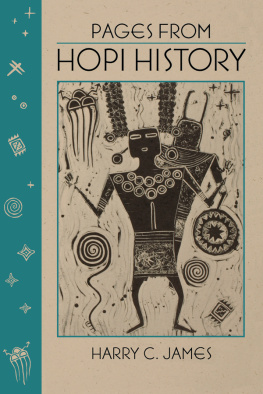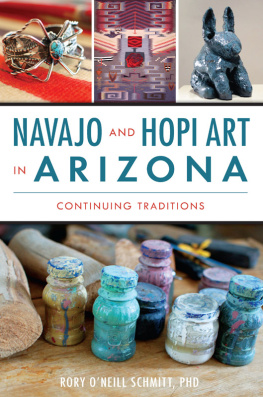A HOPI SOCIAL HISTORY
Anthropological Perspectives on Sociocultural Persistence and Change
Scott Rushforth and Steadman Upham
 | University of Texas Press, Austin |
Copyright 1992 by the University of Texas Press
All rights reserved
First Edition, 1992
Requests for permission to reproduce material from this work should be sent to Permissions, University of Texas Press, Box 7819, Austin, Texas 78713-7819.
utpress.utexas.edu/index.php/rp-form
Library of Congress Cataloging-in-Publication Data
Library ebook ISBN: 978-0-292-76788-1
Individual ebook ISBN: 9780292767881
DOI: 10.7560/730663
Rushforth, Scott.
A Hopi social history / by Scott Rushforth and Steadman Upham. 1st ed.
p. cm.
Includes bibliographical references and index.
ISBN: 978-0-292-73067-0
1. Hopi IndiansHistory. 2. Hopi IndiansSocial conditions. I. Upham, Steadman. II. Tide.
E99.H7R87 1992 | 91-30073 |
973.04974dc20 | CIP |
Contents
Figures
Tables
THIS BOOK is an outgrowth of long and stimulating discussions about sociocultural persistence and change that we have had over the last few years. The dialogue began as we read each others research papers, books, and monographs and offered advice and criticism on work in preparation. Although our anthropological training and backgrounds are different (Rushforth is a cultural anthropologist; Upham is an archaeologist), we found common ground in the way we conceived of culture and society. We also discovered similarities in our views about how behavior and material culture can be identified, described, and used to construct explanations of sociocultural persistence and change.
Further, we found common ground in our interests in the prehistory, history, and ethnology of Southwestern Native American peoples. Rush-forth has conducted most of his anthropological fieldwork among the Northern Athapaskan-speaking Bearlake Indians of Canadas Northwest Territories. His most recent work about Bearlake culture focuses on the persistence of fundamental values among these people. He has worked on linguistic projects among the Mescalero Apache of New Mexico who, along with other Apache and Navajo, also speak languages belonging to the Athapaskan language family. Upham has conducted most of his archaeological investigations in the American Southwest. He has written extensively about prehistoric and early historic Puebloan sociocultural systems. He has focused on the evolution of social and political institutions among these groups, but has also written about indigenous agricultural systems, prehistoric trade and exchange, and the effects on Native Americans of diseases that Europeans introduced during the colonial period.
In our discussions about sociocultural persistence and change we often referred to various prehistoric, historic, and ethnographic examples from the Southwest. We discovered that by concentrating on examples we were able to discuss more clearly and understand the explanatory arguments at issue. If, for instance, we were interested in the role of individual intentional behavior in sociocultural processes, it was useful to focus on an example such as the decline of traditional ritual practices in modern Hopi villages from 1909 to the present. According to one anthropologist (Whiteley 1988a), this ceremonial decline is partially the result of Hopi priests conscious decisions to achieve this end. We found that attending to such specific cases made anthropological argumentation more transparent. It was easier to discuss the form of the explanation, evidential requirements, and connections among various ideas. This experience partially motivates our writing of this book. Our objective is to share that experience with the reader.
We thank Peter Whiteley for reading and commenting on an earlier draft of this book. His criticisms were extremely useful and the book is better because of his help. We also thank anonymous reviewers for the University of Texas Press who read our earlier manuscript. We benefited from their suggestions. Mistakes that remain are our own. We thank Theresa Hanley for helping us with the bibliography.
IN THIS BOOK, we address numerous questions about sociocultural persistence and change. To begin, we consider how anthropologists describe and explain behavior, culture, and society for the groups they investigate. Because anthropology is the study of humankind, anthropologists are concerned about all features of the human condition. Since beliefs about humankind vary and there are so many components of the human condition, anthropologists approach their subject matter from widely divergent positions. Some view their discipline as akin to the hard sciences. These scholars seek objective explanations of facts about the real world and emphasize the necessity of formal observation, controlled investigation of empirical phenomena, and the need to avoid subjectivity in sociocultural description and explanation. Other anthropologists consider their studies to be similar to the interpretive sciences. They seek to discover, describe, interpret, and understand the meanings embedded in symbolic interaction. These scholars emphasize the role of mental phenomena in human existence, view reference to the nonob-servable aspects of human life, such as beliefs and values, to be essential to almost any anthropological description or explanation, and stress the attendance of subjective factors in all scientific endeavors.
Despite such important differences within anthropology, the discipline is unified by a common concern with certain basic questions about individuals and social groups. Among the most crucial of such questions are those about human behavior. Why do people behave the way they do? Why do people from different societies often act in different ways? Why do patterns in the behavior of individuals and groups sometimes persist through time? Why do such patterns sometimes change? Anthropologists answer these and related questions in different ways. Cultural anthropologists like Rushforth frequently do so by providing ethnographic or cultural descriptions. These anthropologists assume that people behave the way they do, in part, because of their culture; because of the beliefs, knowledge, and values they acquire as members of a particular society. Since culture varies from group to group, so does behavior. When cultural systems persist, all other things being equal, patterns in behavior persist. When beliefs, knowledge, and values change, the associated behavioral patterns also change.
Social anthropologists often answer questions about behavior and patterns in behavior by referring to sociological constructs such as social organization and social structure. These anthropologists assume that people behave in specific ways because of the positions they occupy in systems of institutionalized social relationships. Real individuals come and go, but the system of social positions that those individuals occupy (and from which they acquire their rights, duties, and responsibilities) is reproduced and persists.
Archaeologists like Upham answer questions about individuals and social groups by analyzing material culture, the artifacts and other material residues that humans produce. Archaeologists describe, classify, and date all forms of material culture. They are, however, most interested in how such artifacts and material residues are associated and distributed on the landscape, and how the form and structure of these distributions change through time. Because material objects and their distributions reflect aspects of the cultural and behavioral systems in which they were made, used, and discarded, they are useful for studying the origin and development of such systems.

